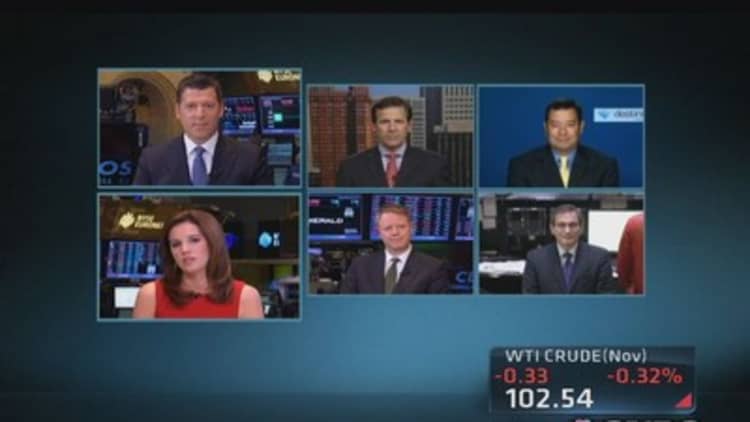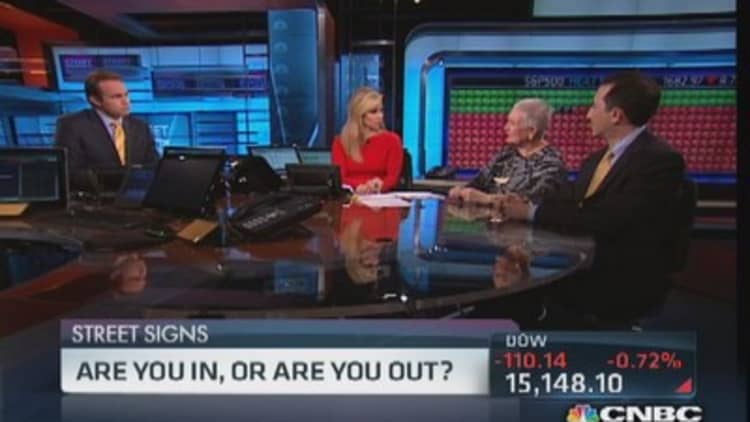Stocks finished sharply lower Monday, as the budget impasse in Washington threatened the first government shutdown in nearly 17 years, but major indexes still capped a rocky month and quarter with robust gains.
(Read more: After-hours buzz: Paychex, Diamond Foods & more)
Stocks took another leg lower in the final half hour of trading after one House Republican member told CNBC that there will be no clean spending bill tonight, marking a government shutdown likely.
Political turmoil in Italy also curbed investor sentiment after Silvio Berlusconi, the leader of the center-right party, ordered a number of his ministers to resign from the cabinet on Saturday, throwing the government into chaos.
Major U.S. Indexes
The Dow Jones Industrial Average slumped 128.57 points, to close at 15,129.67, dragged by P&G and United Tech. The blue-chip index has dropped for the seventh day in eighth.
The declined 10.20 points to finish at 1,681.55. And the Nasdaq fell 10.12 points to end at 3,771.48.
The CBOE Volatility Index (VIX), widely considered the best gauge of fear in the market, jumped near 17.
All key S&P sectors closed in the red, dragged by consumer staples and energy.
For the month, the Dow rallied 2.16 percent, the S&P 500 jumped 2.97 percent, and the Nasdaq soared 5.06 percent. And for the third quarter, the Dow rose 1.48 percent, the S&P rallied 4.69 percent, while the Nasdaq spiked up 10.82 percent.

The Senate rejected the House of Representative's budget bill, making the shutdown of many agencies at midnight tonight much more likely. The nation faces its first government shutdown in 17 years.
In a 54 to 46 vote, the Senate stripped provisions that would have delayed the implementation of Obamacare by a year, and instead sent an emergency spending bill to the House, where its fate is uncertain.
(Read more: DC 'shenanigans' may cap stock gains: Bob Doll)
U.S. Treasurys ticked higher, driven by a bid for safe haven assets.
President Barack Obama said he's "not at all" resigned to a government shutdown adding he expects to speak to congressional leaders during the day and in ensuing days to address budget and debt impasses.
Last week, major averages logged their first weekly drop since August with investors nervous over a potential shutdown.
"Just as one arguing couple can ruin a large dinner party, the sight of a dysfunctional political process is an unwelcomed development for investor confidence in stocks," wrote Nicholas Colas, chief market strategist at ConvergEx Group. "If and when a government shutdown starts, the clock will start ticking on lower GDP growth rates and reductions in corporate earnings."
(Read more: How budget stalematecould hit the IPO market)
Many government employees will be furloughed by the absence of a deal, and if the shutdown takes place the Labor Department will postpone issuing its closely-watched monthly employment report scheduled for Friday.
Defense names were in the red, as a government shutdown would most likely diminish the number of new contracts. Lockheed Martin and Alliant Techsystems both declined.

On the economic front, he pace of business activity in the U.S. Midwest increased to 55.7 in September from 53.0 in August, according to the Institute for Supply Management-Chicago. A reading above 50 indicates expansion in the regional economy.
Paychex is the only notable company scheduled to post earnings after the closing bell.
Interbrand's annual Global Brands report ranked Apple as the most valuable for the first time, displacing perennial number one Coca-Cola.
Disappointing economic data from China also sapped investors' appetite for risk. China's final reading of manufacturing activity from HSBC came in at 50.2 in September, lower from a preliminary reading of 51.2 earlier this month. Still, the data was higher from August's 50.1 reading. The Chinese Shanghai Composite outperformed as the region's sole gainer, while Japan's Nikkei index closed down 2 percent.
"This is as good as it gets for the time being. The data reflects the stimulus over the summer but don't expect too sharp an acceleration from here," said Frederic Neumann, co-head of Asian economic research at HSBC.
The pan-European FTSEurofirst 300 closed in the red and the Italian blue-chip FTSE MIB index dropped approximately 1.5 percent, suffering its worst session in nearly six weeks.
—By CNBC's JeeYeon Park (Follow JeeYeon on Twitter: @JeeYeonParkCNBC)
On Tap This Week:
TUESDAY: PMI mfg index, ISM mfg index, construction spending, auto sales; Earnings from Walgreen, Global Payments
WEDNESDAY: Mortgage applications, ADP employment report, Bernanke speaks, Dell event; Earnings from Monsanto
THURSDAY: Challenger job-cut report, jobless claims, factory orders, ISM non-mfg index, natural gas inventories, Fed's Fisher speaks, Fed Gov Powell speaks, Fed balance sheet/money supply; Earnings from Constellation Brands
FRIDAY: Nonfarm payrolls, Fed's Kocherlakota speaks
What's Trending on CNBC.com:


